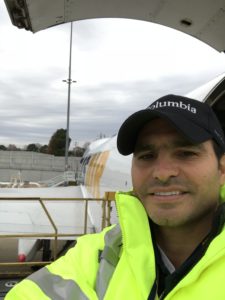 In celebration of Hispanic Heritage Month, we introduce you to Ground Operations Senior Director, Training & Compliance, Juan Rodriguez.
In celebration of Hispanic Heritage Month, we introduce you to Ground Operations Senior Director, Training & Compliance, Juan Rodriguez.
As Senior Director Ground Operations Standards, Training and Compliance, I oversee five operational support teams – Loadmasters, Special Loads, Standards & Procedures, Systems & Development and Training. Each teams plays a key role in ensuring the safety and efficiency of our operations.
In addition, I serve as a liaison to The Federal Aviation Administration (FAA).Ground Operations manages the regulatory policies, procedures and training for the Company’s FAA-approved Weight and Balance Control Program as well as its Dangerous Goods Program. I’m responsible for handling all interaction between the FAA and the Company related these programs. I also manage any policies or procedures, development and updates pertaining to these FAA-regulated programs.
My favorite part of working at Atlas is that there are so many different business segments, each with its own individual requirements, which makes every workday a different and exciting experience.
My dad was a Captain (he is now retired) for Panamanian carriers, including Air Panama and COPA Airlines. As a result, I was always around airplanes and joined him in the cockpit for a lot of trips. As a kid, I thought this was incredible and I thought I wanted to be a pilot, just like my dad.
My dad sat me down one day and explained that while he loved being a pilot, it was also a tough job for the family because he missed important milestones like birthdays and holidays. He unfortunately even missed the birth of one of my siblings (I have 3 brothers and 1 sister). I still loved aviation though and decided to pursue it as a career, just from a different angle.
My first job was as a flight attendant at COPA Airlines. I did this while attending Panama Canal College, where I graduated from a 2-year program with an Associate Degree.
After completing that program, it was recommended that students transfer to a college in the U.S. to finish their studies, which was what I really wanted to do. In 1989 however, the U.S. invaded Panama, which resulted in the removal of General Manuel Noriega from power. My family and I decided to apply for U.S. residence, since my grandparents were both U.S. citizens. One thing led to the next, and all of my family members obtained U.S. residency. One of my brothers and I moved to Miami, because we had some friends already living there.
Once I was settled, I attended Florida International University and Florida State University. From there, I obtained an FAA Dispatcher’s license from Aviation Technical Services (also in Miami) and then I received my MBA in Aviation from Embry-Riddle Aeronautical University.
In my opinion, Hispanics are responsible, respectful and very hard-working people by nature. Ultimately, my goal is to make the world a better place to live for everyone.
I was born and raised in Panama City, Panama in Central America. My country had a lot of U.S. influence due to the Panama Canal, which was built, operated and managed by the U.S. government for many years. Additionally, the U.S. Armed Forces Southern Command was based in Panama.
My grandfather was a U.S. veteran, so growing up I had the opportunity to see for myself the difference between the U.S. and the Panamanian living style. I attended a bilingual school with most classes taught in English, which was helpful for me. I was able to come to the U.S. with a student exchange program during the summer and I attended a high school in Utica, Michigan.
Once I had finished the exchange program, I knew that I wanted to eventually return to the U.S. to live and work full-time. From that moment on, I became very goal oriented. I learned that if you keep a positive attitude, prepare yourself well, maintain discipline, and work hard, it will result in opportunities in life. It inspired me to follow my goals and dreams while working in the industry that I love, which is aviation.
My family and I are very proud of our heritage every day. Before COVID-19, family gatherings took place on most weekends and sometimes even during a weekday. Since we celebrate our heritage all the time, we don’t typically plan for a special celebration during Hispanic Heritage Month.
Aviation is a challenging industry with many ups and downs, and you have to constantly adapt in an ever-changing environment. In pilot talk you have to “aviate, navigate and communicate,” to make it through. At the end of the day, it is a very satisfying and rewarding industry. Working with people with different backgrounds, education and experience for a common goal is simply wonderful!